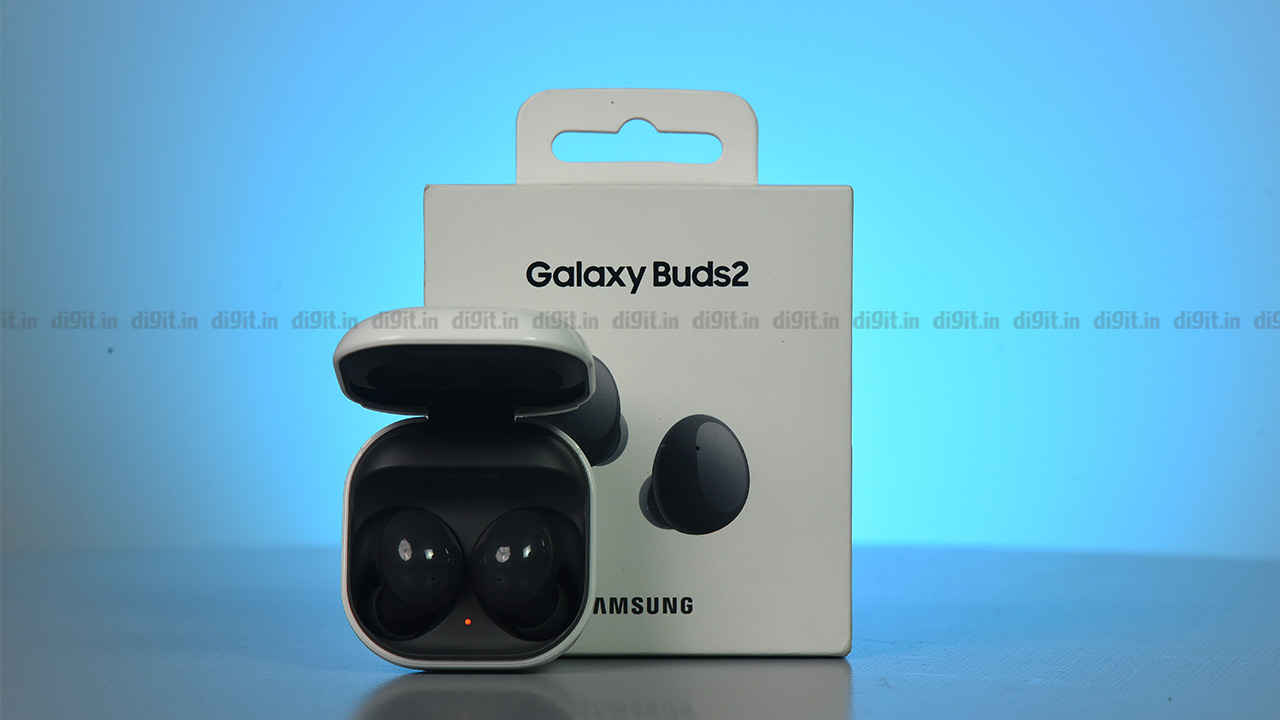Samsung foray into the true wireless earbuds market has mostly been a successful one and the company’s latest in this segment are the Samsung Galaxy Buds2 that launched alongside the Galaxy Fold3 and Flip3 smartphones. Priced at Rs 11,999, the Samsung Galaxy Buds2 are technically the successors to the original Samsung Galaxy Buds that launched way back in 2019, but the improvements seen in this iteration make them a solid upgrade even over the Samsung Galaxy Buds+. Equipped with Active Noise Cancellation, Galaxy Wearable app support, Qi wireless charging, and more, the Samsung Galaxy Buds2 are an enticing offering. But how do they perform compared to their competitors and do they offer comparable features to justify the 12K price tag? We’re going to find out that and more in this review.
Samsung Galaxy Buds2: Performance
There’s not much Samsung has divulged about the drivers used in the Galaxy Buds2. All we know is that the earbuds come packing a 2-Way driver setup with one woofer and one tweeter. As with most of the company’s audio devices, the Buds2 are tuned in collaboration with AKG, a subsidiary of Harman owned by Samsung itself. As for audio codecs, the earphones support the SBC, AAC and Samsung Scalable codecs. The Samsung Scalable codec is only compatible with modern Samsung devices and it is pretty comparable to aptX, although aptX allows for widespread adoption across Android phones. We primarily tested the earphones with the Samsung Galaxy 20 Ultra and were able to use the Scalable codec.
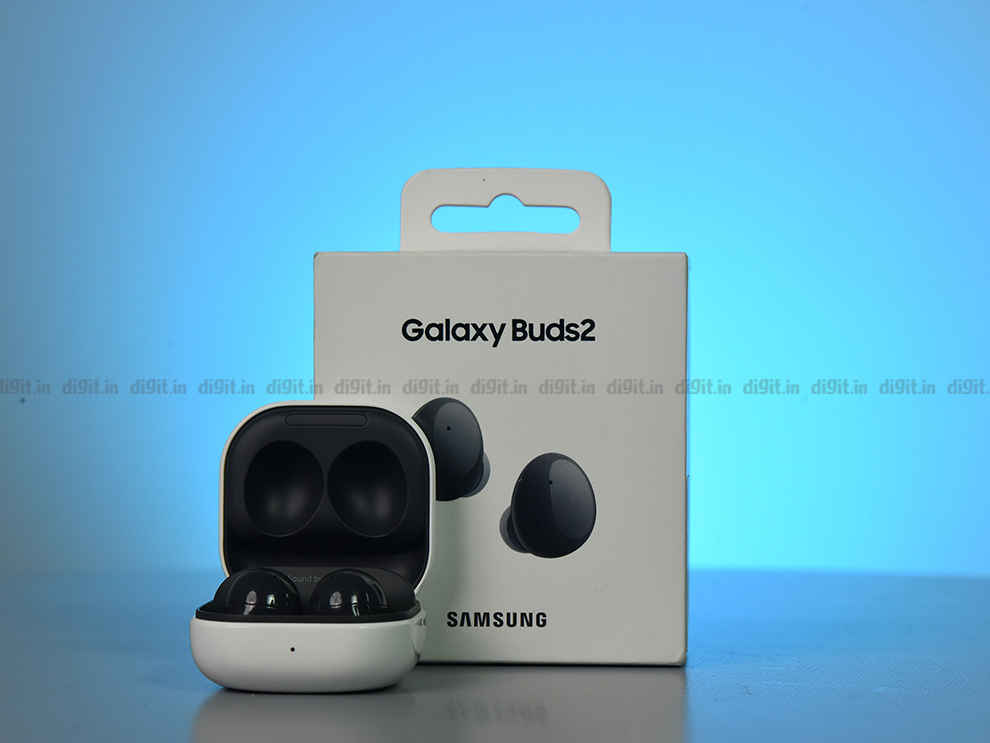
We did find a discernible difference in quality, but the difference wasn’t extremely drastic. You should have an enjoyable experience with AAC as well. As for the sound signature, you get a sufficiently detailed and clear representation but there’s some colouring in favour of the bass region. We used a measurement microphone from iSEMcon paired with an adapter from SLS audio to test the earphones using the SMAART Di-v2 software.
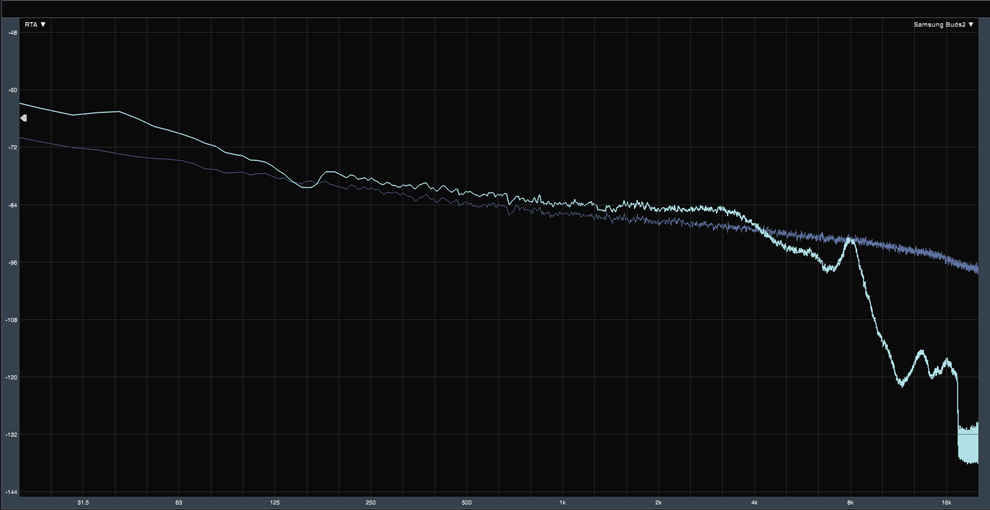
Uncompensated frequency graph of Samsung Galaxy Buds2 (White) vs Flat response (Light blue)
Our finding was a downwards slopping frequency graph, albeit there’s a slight peak in the 8kHz region that can cause the treble to sound harsh and some vocals to sound slightly sibilant at times. The bass response is exaggerated quite a bit, more so than its more expensive sibling – the Samsung Galaxy Buds Pro. So, the sound may get slightly muddy occasionally. However, it doesn’t happen too often.
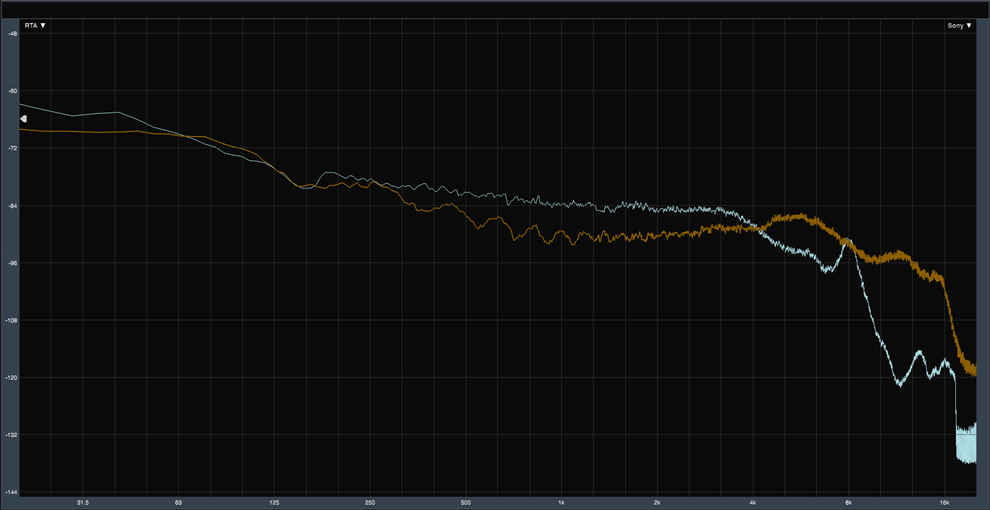
Uncompensated frequency graph of Samsung Galaxy Buds2 (White) vs Sony WF-1000XM3 (Orange)
Also, usually, when the bass is exaggerated as much as seen on the Galaxy Buds2, the mids suffer from considerable auditory masking, meaning they get hidden or veiled due to the overbearing bass. But this is not the case here since the tuning is done in such a way where the mids are also properly highlighted. You can see that in the graph, the mids are slightly overexaggerated as well, so the vocals and main instruments are still prominent in the mix. The treble quality is slightly inconsistent, at times it sounds nice and bright, but it can get a bit too harsh sometimes due to the huge peak at 8kHz.
Instruments sound lively, the sound separation is pretty stellar and the soundstage is decent as well. The 2-way driver does a good job at maintaining clarity and detail in the sound. Additionally, if you’re using the Scalable codec, the soundstage opens up more and you get to hear a bit of extra detail in tracks as well.

Moving on to microphone quality, the Samsung Galaxy Buds2 are equipped with three microphones and we found that they do an acceptable job. The sound is picked up adequately well and is pretty natural, although the microphone does pick up a lot of environmental sounds during phone calls and recordings. The Google Pixel Buds A-Series and the OnePlus Buds Pro actually have slightly better microphones despite being around 2K cheaper.
As for wireless connectivity, the Galaxy Buds2 is powered by the latest Bluetooth v5.2. The connection was rock solid during about 90-95 per cent of our testing period. We did face some occasional stutters in the connection but they were resolved in a second and didn’t bother us too much. Additionally, there’s hardly any noticeable latency when using these earphones, especially with the Samsung Scalable codec active.
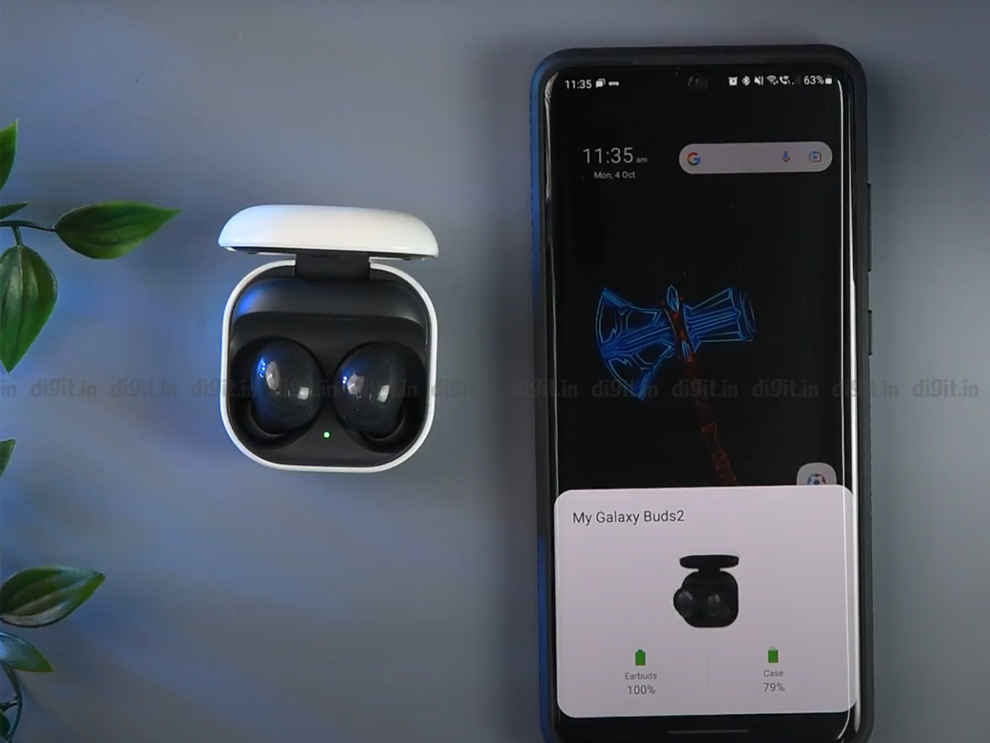
With AAC codec there’s very little noticeable latency as well. There’s a Gaming mode that can be activated with the Galaxy Wearable app, however, it is part of “Labs” meaning it isn’t a fully refined feature yet. The app warns you that you may suffer from some choppy sound when using this mode if you’re in an environment with a lot of wireless devices, which doesn’t really inspire confidence. We hope Samsung can bring a refined Game Mode in the next iteration of truly wireless earbuds they come out with.
Samsung Galaxy Buds2: Active Noise Cancellation and other features
Priced at Rs 11,999, the Samsung Galaxy Buds2 are a feature-laden pair of truly wireless earphones and come with quite a few features that were missing from the original Galaxy Buds. One such feature is Active Noise Cancellation. The Active Noise Cancellation performance is pretty decent on these buds and matches up to the performance delivered by its more expensive sibling – the Samsung Galaxy Buds Pro.
Low-end, constant sounds are easily mitigated, however, the buds don’t perform as well as say the Sony WF-1000XM3 at diminishing high-frequency sounds such as mechanical keyboards, people speaking, and more. Ambient Sound is also available and users can toggle between three levels of Ambient Sound via the Galaxy Wearable app. We found the Ambient Sound unnecessarily strong at the highest level, so we advise you to keep it between Medium and Low modes.
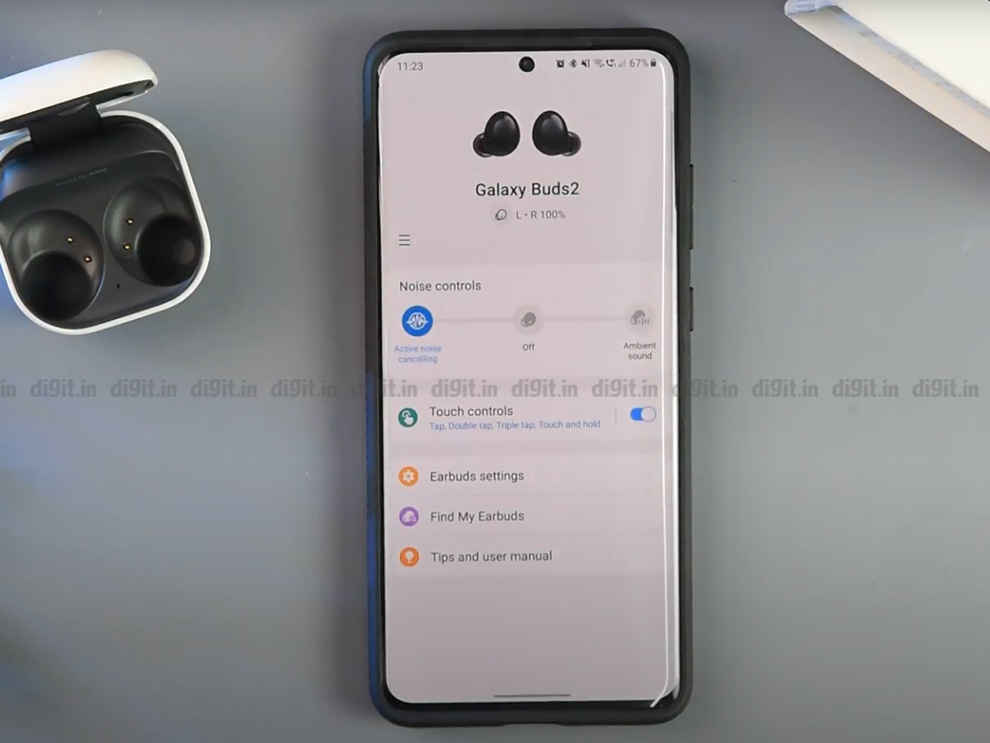
The next most appealing feature after ANC is Galaxy Wearable app support that allows users to access many features and tweak some earbud settings. The app lets you control noise cancellation modes, tweak around some touch controls, choose between six different EQ settings, perform the earbud fit test to determine if the silicone tips are providing you with a secure fit, use the Find my earbuds feature, and toggle on or off a few other modes such as Seamless earbud connection, Gaming mode, and others.
Now, the app is extremely barebones when it comes to control customizability. All you can do is tweak the touch and hold function. We wish Samsung allowed users to control not just one but all controls including tap, double-tap and triple-tap on both earbuds. It would have given users a lot more room to customise the controls according to their preference.
You can also toggle on Bixby voice-wake up within the app and use handsfree assistant on Samsung devices by saying the wake phrase “Hi Bixby”. While Bixby isn’t the best assistant out there, it’s pretty convenient for Samsung users who quickly want to make phone calls or send messages without tapping a button.
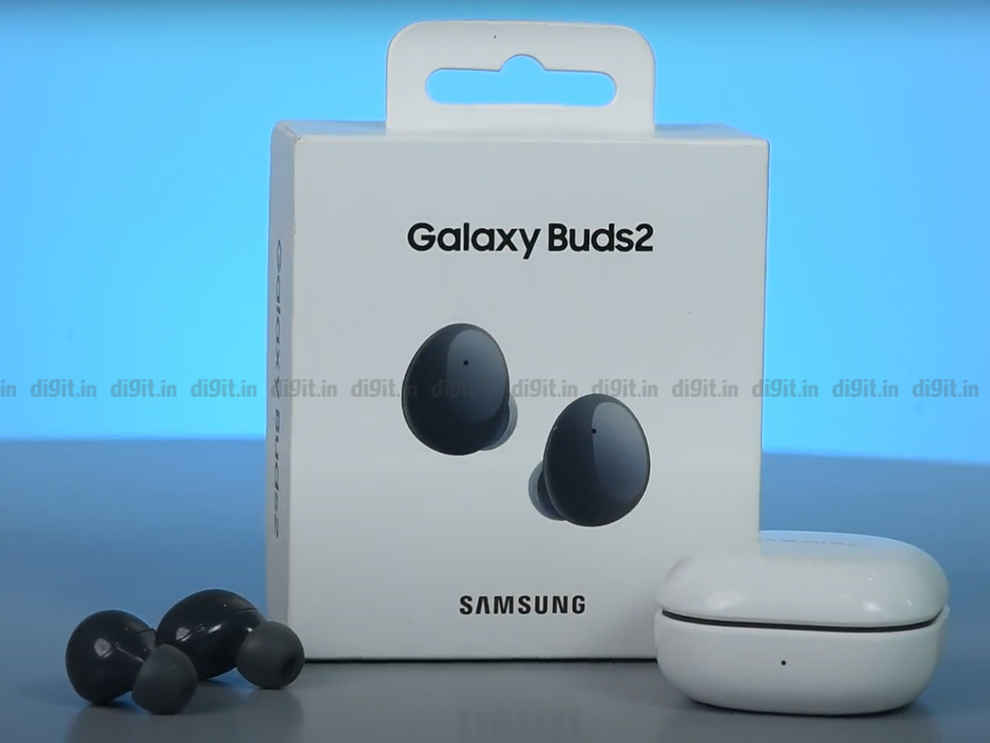
The Seamless earbud connection feature, when toggled on, allows users to auto-switch between Galaxy devices without having to press any button. So, you can go from streaming music on your tablet to picking up a call on your smartphone easily. The astounding part is that the earbuds switch to ANY Samsung device nearby that is signed in to your Samsung account, even if you have never paired it with the Buds 2 before, which is honestly pretty great but only if you own more than one Galaxy device.
If you own a Galaxy device, pairing is a breeze. All you do is open the case and bring it near your device and you’ll see a pop up prompt asking you to connect to the earbuds pretty much instantaneously. You can also set up a widget on Galaxy devices to quickly glance at your Buds2’s battery life and more. The buds also come with some new features that you can activate via the app. You can choose to toggle on ambient mode during calls to hear your own voice more clearly. There’s also a lab section with some experimental features such as Gaming Mode, which we already spoke about before, and volume control by double-tapping either earbuds’ edge. We tried controlling volume levels this way but it didn’t work reliably at all, so we see why this feature is an experimental one.
The Galaxy Wearable app is available for all Android devices, and Android users will be able to leverage most features available, but the Buds2 are not compatible with the iOS Samsung app yet so you won’t be able to use any of the app features if you’re an iOS user, which is very disappointing. We hope Samsung adds compatibility soon but we don’t have our hopes up since the Galaxy Buds Pro are still not compatible with the iOS Galaxy app.

ANC and app aside, the buds come with a few other features such as Qi wireless charging support for the case, Bluetooth v5.2 wireless connectivity, mono earbud use, and IPX2 rating. The IPX2 rating looks weak in front of most TWS earbuds these days, especially at this price range. The OnePlus Buds Pro for example comes with an IP55 dust and water resistance rating, which makes Samsung’s IPX2 offering look puny in comparison. A feature we missed was wear detection that automatically pauses or plays music depending on whether you’re wearing the buds.
Samsung Galaxy Buds2: Battery life
The battery life of the Samsung Galaxy Buds2 is nothing to write home about. With ANC on, the battery life is rated at 5 hours on the buds alone and 20 hours coupled with the charging case. While TWS such as the Sony WF-1000XM3 and even the cheaper OnePlus Buds Pro beat out these numbers, the battery life is higher than the Galaxy Buds Pro which is rated at 18 hours of total battery life with ANC on.
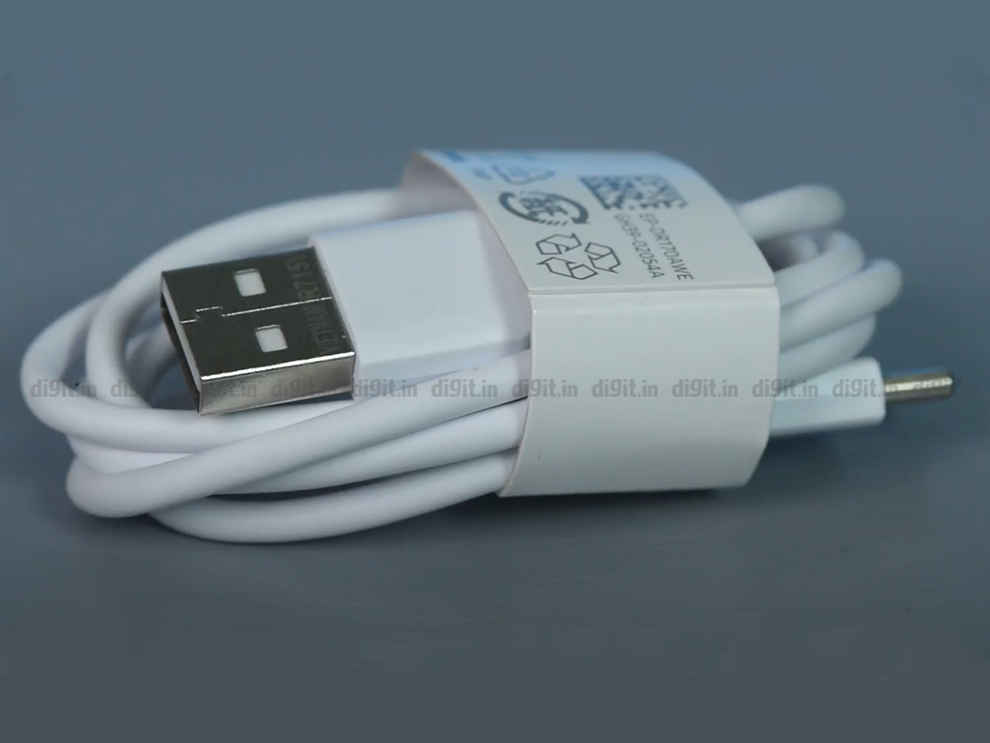
With ANC off, these numbers are bumped up to 29 hours in total with 7.5 hours on the buds alone, which is decent. In our tests, we got about 4.5 hours of playtime on the buds alone with ANC turned on and the volume levels set to around 60 per cent. There’s a quick charge feature where 5 minutes of charging gets you about an hour’s worth of playtime.
The charging case can also be charged wireless on any Qi-enabled wireless charger, including the back of some smartphones with reverse wireless charging which is pretty convenient.
Samsung Galaxy Buds2: Build and comfort
The Samsung Galaxy Buds2 are a departure from the design language of the original Galaxy Buds and Galaxy Buds+. They resemble the Galaxy Buds Pro more with a clamshell charging case design. The buds are available in four different colours – Graphite, Olive, Lavender and White. We got the Graphite variant for review. All the colour variants sport a white-coloured glossy finish on the charging case and opening up the case reveals the dual-tone design. The Graphite variant sports a dual white and black tone with the buds being completely black. These buds are also a lot lighter and smaller compared to the Samsung Galaxy Buds Pro and the Buds+.
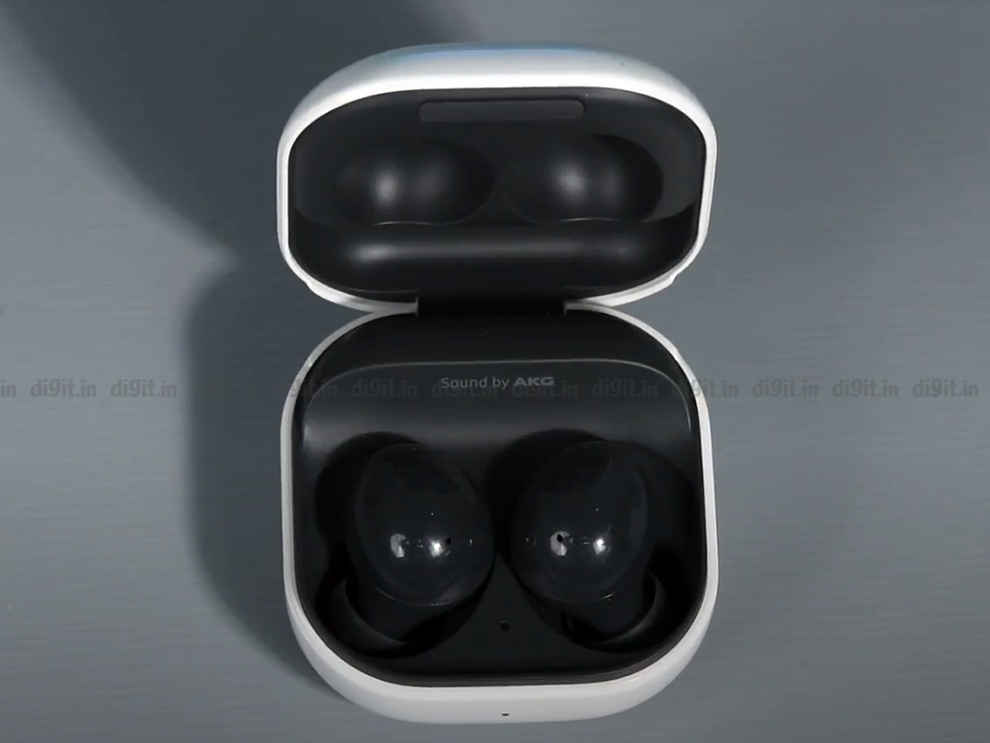
With each earbud weighing merely 5g, the difference is immediately felt. The earbuds are diminutive in size and fit inside the ear snugly. They appear quite flush to the ear and have an incredible fit, only rivalled by a few other TWS we’ve tested over years. Plus, due to the smaller size and lighter weight, you can wear these buds for longer periods of time without any discomfort. The charging case and the buds sport a glossy look which looks slightly less premium than earbuds with a matte finish.
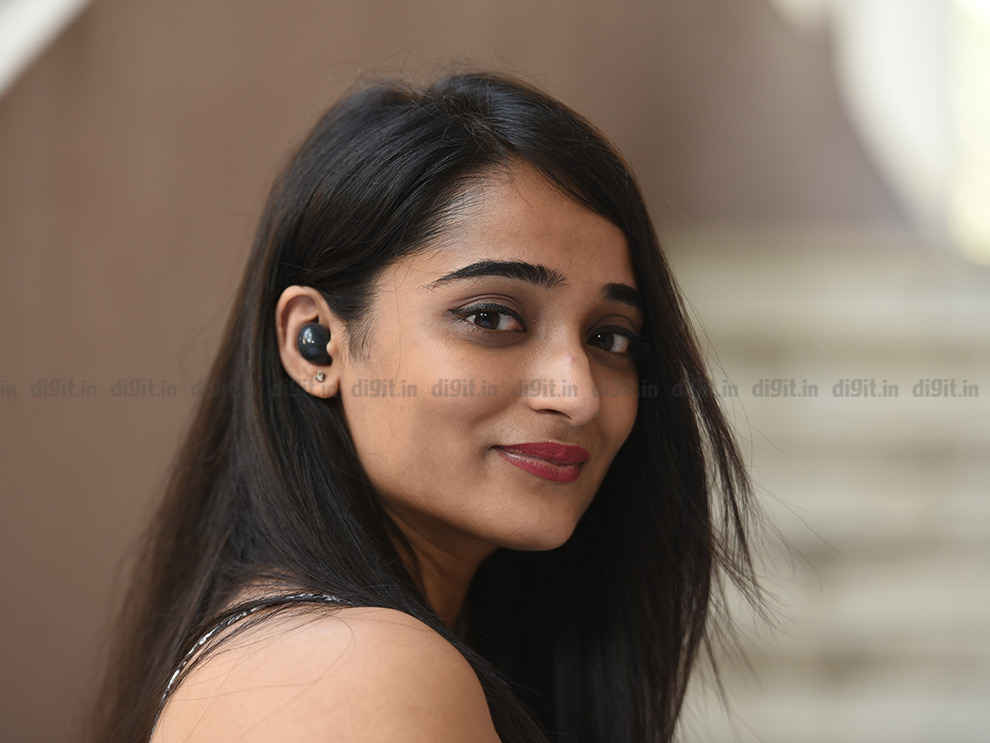
The earbuds have a phenomenal fit and do not budge from the ears even when walking, jogging or doing chores around the house. There are also 2 additional pairs of silicone tips provided, so most people should be able to find a secure fit. Now, they do only come with an IPX2 rating, so we wouldn’t feel comfortable recommending using these earphones when working out, especially if you sweat a lot.
The charging case has a clamshell design similar to the Galaxy Buds Live and Galaxy Buds Pro. The square-shaped case houses an LED indicator on the front and a USB-C charging port at the back. The magnets holding the buds in are slightly weak and the buds could topple out of the case if you drop it. Overall, the Galaxy Buds2 look pretty decent with their dual-tone action and have a secure and comfortable fit.
Samsung Galaxy Buds2: Verdict
The Samsung Galaxy Buds2 are, no doubt, a substantial improvement over the original Galaxy Buds offering better sound quality, active noise cancellation and a phenomenal fit. The buds are smaller and lighter than Samsung’s previous TWS offerings and are one of the most discrete earbuds we’ve tested because of how nicely they nestle into ears. The earbuds also offer decent ANC performance and a warm sound profile with a spacious enough soundstage. While there are some misses such as unreliable microphone performance in noisy environments, lacklustre control customisability and only an IPX2 rating, the earbuds are a pretty good option to consider under 15K, especially if you own a Samsung device.
Using a Samsung device, the earbuds allow you to leverage a few Samsung exclusive features such as quick pair, widget control and Samsung Scalable codec. However, if you’re an iOS user, we would advise you to look elsewhere since these buds are not supported on the iOS Samsung app and you would miss out on a lot of features enabled via the app. Also, offerings such as the OnePlus Buds Pro, and Oppo Enco X are cheaper and offer comparable, or better, features and sound. If you can stretch your budget, you can also get the Sony WF-1000XM3 that provide much better ANC and sound quality at under 15K on e-commerce sites such as Amazon during sales.
(Except for the headline, this story has not been edited by PostX News and is published from a syndicated feed.)

